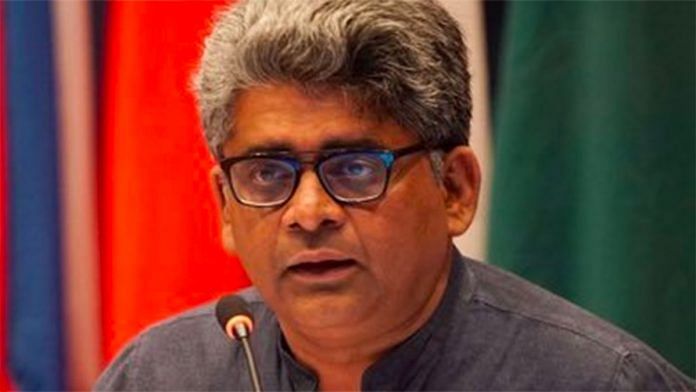New Delhi: A member of the Prime Minister’s Economic Advisory Council has blasted the Narendra Modi government’s decision to raise sovereign bonds overseas, likening it to an “addiction”.
Rathin Roy, who also heads the National Institute of Public Finance and Policy (NIPFP), said India is going through a “silent fiscal crisis” that can be gauged from the government’s “inexplicable decision” to issue sovereign bonds overseas.
Roy’s opposition to the move comes days after two former Reserve Bank of India (RBI) governors — Y.V. Reddy and Raghuram Rajan — strongly opposed the proposal highlighting the enormous risks of such issuances.
A sovereign bond issuance in external currencies will increase India’s vulnerability to international financial markets volatility and uncertainty. In the past, there have been talks of a sovereign bond issuance by India but such proposals never found favour with the RBI.
In her budget speech on 5 July, Finance Minister Nirmala Sitharaman said, “India’s sovereign external debt to GDP is among the lowest globally at less than 5%. The government would start raising a part of its gross borrowing programme in external markets in external currencies.
“This will also have beneficial impact on demand situation for the government securities in domestic market.”
Also read: Credit guarantee to banks, more powers to RBI as Modi govt moves to nip NBFC crisis in bud
‘Addiction’
Speaking at a budget event organised by leading think-tanks Monday, Rathin Roy said he has grave concerns over the proposal on grounds of economic sovereignty and macroeconomic consequences.
The NIPFP director said that the budget announcement without consultation strikes at the very spirit of good governance and democracy.
Roy said that no country after the Second World War “has taken up this addiction like smoking of sovereign bond debt and not paid dearly for it”. He cited the examples of countries like Brazil, Argentina, Mexico, Turkey, Indonesia and Greece to further his argument.
Terming the announcement as a “watershed” in the budget, Roy said no government irrespective of their mandate has the right to decide to go in for a sovereign bond issuance without a discussion.
“The government is being extraordinarily un-consultative about this,” he pointed out.
What the former governors have said
On Monday, Rathin Roy urged the Modi government to listen to all former governors and professionals who have strongly voiced their opposition to the move.
In a column for Business Standard last week, Y.V. Reddy said that there is no legally-binding debt restructuring mechanism in respect of sovereign debt and while the International Monetary Fund (IMF) has made efforts in addressing this, nothing has fructified yet.
He pointed out how this is a perpetual liability, adding that when a country goes in for such issuances, it loses jurisdictional sovereignty making itself vulnerable to hostile creditor legal action.
Raghuram Rajan, in a column for The Times of India earlier this month, argued that instead of issuing sovereign bonds, the restrictions on foreign portfolio investment in government bonds should be relaxed. He also said that most countries issue bonds in foreign currency only when they are not able to issue them in their domestic currency.
Fiscal crisis
Rathin Roy was also critical of the bureaucracy for failing to estimate the shortfall in tax revenues. He said that the Rs-1.7 lakh crore shortfall in tax estimates doesn’t happen suddenly.
He attributed the shortfall to a massive overestimation of the goods and services tax revenues.
The total net tax revenues stood at Rs 13.16 lakh crore as of March end, as against an estimated Rs 14.84 lakh crore.
Also read: India will face a fiscal crisis if BJP or Congress fulfil their election promises




It would be unfortunate as the country celebrates its 75th anniversary of independence, to reconnect with the situation where the country borrowed. We point out the financial situation of one of our neighbors, it would be unfortunate if we also put our finger on such a gear. But perhaps all this is also due to the way the budget was voted and to its lack of clarity in its funding. It is true that there is an international climate that encourages debt-low rates, but this can not and should not be used as a pretext. Because today’s loans are debts for future generations.
B.J.P with its unprecedented majority should not take major Financial decisions without proper consultations with economic advisers. Usually when Hon.Prime Minister is Very strong his Ministers will like to say what he likes to hear.Therefore Hon.Prime minister himself should ask for opinions from experts.
Modi-1 was 1 demonetization, Modi-2 sovereign borrowing!
Even bigger addiction is socialist welfare. Endless socialism and borrowing will take the country down into a bottomless pit.
Silent fiscal crisis. The countours are becoming clearer with each passing day. It is possible that the proposed sovereign bond issue itself will meet with a tepid response. Anyway, it is good that an informed debate is taking place on such an important issue.